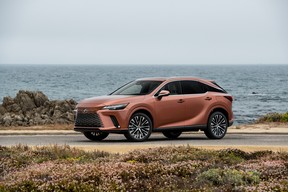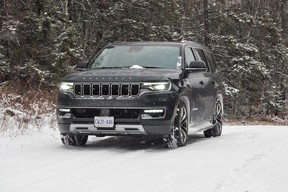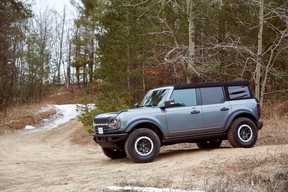One of 2022’s 10 hungriest market share earners wasn’t even a brand seven years ago

Article content
Four premium auto brands were among Canada’s fastest-growing fleet of marques in 2022, a year of turmoil for the global auto industry. As supply woes strained the dealer network, the majority of automakers failed to even remotely come close to typical annual sales volume.
Advertisement 2
Article content
Yet in spite of a Canadian market that fell 9 per cent from 2021 levels to the lowest output since 2009’s recession-era collapse, some car and truck manufacturers actually generated more sales activity. While Honda, for example, surrendered nearly two full percentage points of Canadian market share from 2021 to 2022, and while Nissan shed nearly a full point, traditional Detroit manufacturers huddled together in a market-share-gobbling cabal that caused the traditional domestic brands to produce their best collective market share since 2017.
The automobile market is evolving at a decidedly rapid rate. Not only are brands rising and falling in absurdly quick fashion, so too are segments and even some of the most storied nameplates. On the one hand, one of 2022’s 10 hungriest market share earners wasn’t even a brand seven years ago. But on the other hand, Canada’s 24-time best-selling car lost its crown in 2022 thanks to a 32-per-cent year-over-year sales decline.
Advertisement 3
Article content
The automotive business was never intended for the faint of heart, of course. Fortunately for the 10 brands profiled here, 2022 was a year in which Canadians turned more and more in their direction.
Keep two factors in mind. First, we’re only highlighting auto brands that report model-specific, market-specific, quarterly sales figures. Second, in a market valued at a little more than 1.5 million units in 2022, one-tenth of a percentage point of market share is the equivalent of 1,500 sales; one point of market share is 15,000 sales.

10. Lexus: 1.7 per cent
Although Lexus’s Toyota brand failed for much of the year to deliver vehicles in the substantial quantities to which its dealers are accustomed — Camry, Corolla, Prius, 4Runner, Highlander, Sienna, Tacoma, Venza all tumbled double-digits — the upmarket Lexus brand actually posted loss modest enough to actually gain market share. Lexus ended the year with 25,024 sales, a slight 3 per cent decline, but sufficient to grow its market share by one-tenth of a point to 1.7 per cent. Lexus ended the year only 2,842 sales behind BMW. Pre-pandemic, that gap was more than 11,000 units.
Advertisement 4
Article content
9. Genesis: 0.4 per cent
Genesis remains a fledgling member of the global luxury auto sphere, but the brand’s growth rate is rapid. Genesis sold 525 vehicles in Canada in 2017 (its first full year), 1,441 vehicles in Canada in 2018, 1,525 in 2019, 1,462 in 2020, and then 4,569 in 2021 as SUVs finally took hold. Genesis sold 5,749 vehicles in Canada in 2022, including 4,163 utility vehicles. That’s more total vehicle sales than established premium brands such as Infiniti, Land Rover, and Jaguar. Genesis owned 0.3 per cent of the market a year ago.
-
![Driving By Numbers: 10 biggest brand losers in Canada in 2022]()
Driving By Numbers: 10 biggest brand losers in Canada in 2022
-
![What are the most and least reliable auto brands?]()
What are the most and least reliable auto brands?

8. Audi: 1.9 per cent
Audi’s 29,137 Canadian sales in 2022 topped all other premium brands, including the 28,490 sold by previous No.1 Mercedes-Benz (excluding Sprinter and Metris commercial vans). Audi’s share of the overall Canadian market grew by two-tenths of a point to 1.92 per cent thanks to a 1-per-cent overall increase in sales. Audi cars actually reported a 26-per-cent year-over-year increase.
Advertisement 5
Article content
7. Cadillac: 1.0 per cent
The seven most significant improvements in Canadian auto industry market share in 2022 belonged to brands traditionally labelled as U.S. domestic outfits. Cadillac’s surge, however, isn’t a one-off. GM’s top-tier marquee produced 15,215 sales in 2022, a 15-per-cent year-over-year increase but also a 14-per-cent rise over the last half-decade and a 129-per-cent jump over the last decade.

6. Jeep: 4.0 per cent
Jeep’s 60,266 sales in 2022 made the SUV-only brand Canada’s 10th-best-selling auto brand overall. A 0.5-per-cent uptick in volume caused Jeep market share to rise by nearly half-a-point to 4 per cent. Mind you, Jeep was in an even better position prior to the second-half meltdown — Jeep earned 4.6 per cent of all Canadian auto sales between January and July.
Advertisement 6
Article content
5. Chrysler: 0.9 per cent
With both of Stellantis’s minivans now operating under the Pentastar banner, Chrysler’s sales surged 71 per cent to 13,691 units in 2022 even as Dodge — the former home of the previous-gen Grand Caravan — plunged 17 per cent to 12,774 sales. The transition caused Chrysler’s market share to grow by more than four-tenths of a percentage point to just under 1 per cent.
4. Ram: 5.4 per cent
No, 2022’s surging fuel prices did not cause a mass pickup truck exodus. Full-size pickup trucks accounted for 20 per cent of the Canadian new vehicle market, up from 18 per cent in 2021. What does Ram sell? Better than 9 out of every 10 Rams sold in Canada is a full-size pickup truck. Ram’s market share grew by seven-tenths of a point in 2022 thanks to 81,483 total sales.
Advertisement 7
Article content

3. GMC: 5.8 per cent
With market share growth of nine-tenths of a percentage point, GMC clearly benefited from the same factor as fourth-ranked Ram and the two other big market share earners: full-size pickup trucks are still a hot item. Canadians registered over 307,000 of them in 2022, and 17 per cent of them were GMC Sierras. The Sierra, meanwhile, produces 6 out of every 10 GMC sales: 52,318 of 87,133.
2. Chevrolet: 7.6 per cent
Up a solid point from 6.6 percent one year ago, Chevrolet sales jumped 5 per cent to 114,436 units in 2022. Only Ford and Toyota — the latter suffered a market share loss worth four-tenths of a point — sold more vehicles in Canada in 2022. Chevrolet earned year-over-year sales growth from the Bolt, Camaro, Malibu, Blazer, Colorado, Equinox, Express, Silverado, Suburban, and Tahoe.

1. Ford: 15.4 per cent
From 14.2 per cent in 2021 (and 14.9 per cent in 2020), the Blue Oval essentially remained on an even keel with over 230,000 sales in 2022, enough to claim 15.4 per cent of all Canadian auto sales. The only other brand to generate more than 1-in-10 sales is Toyota. Ford’s F-Series, on its own, generates the same amount of market share as the entire Chevrolet brand. Ford’s 2022 improvement, however, occurred in large part thanks to growth from key new vehicles. The Bronco, Bronco Sport, and Maverick grew their collective volume by 73 per cent to 29,196 units.
Stay connected with us on social media platform for instant update click here to join our Twitter, & Facebook
We are now on Telegram. Click here to join our channel (@TechiUpdate) and stay updated with the latest Technology headlines.
For all the latest Automobiles News Click Here




Comments
Postmedia is committed to maintaining a lively but civil forum for discussion and encourage all readers to share their views on our articles. Comments may take up to an hour for moderation before appearing on the site. We ask you to keep your comments relevant and respectful. We have enabled email notifications—you will now receive an email if you receive a reply to your comment, there is an update to a comment thread you follow or if a user you follow comments. Visit our Community Guidelines for more information and details on how to adjust your email settings.
Join the Conversation